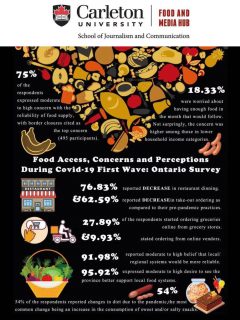About
Carleton Food and Media Hub ran the Ontario part of the interprovincial survey titled Food Access, Concerns & Perceptions During the COVID-19 Pandemic. The survey report is available with all reporting materials on the project’s webpage.
The survey was part of a larger collaboration among the Institute for Sustainable Food Systems (Kwantlen Polytechnic University), School of Public Health (University of Alberta), School of Journalism and Communication (Carleton University), School of Human Nutrition (McGill University) and Food Policy Lab (Dalhousie University). The survey was administered in British Columbia, Alberta, Ontario, Quebec, and Atlantic Canada. Links to the other provincial/regional reports are provided in Appendix B. We are grateful for the support of all the collaborators and extend special thanks to the Institute for Sustainable Food Systems team, for their leadership on this project and extensive contributions to our discussion section.
Funding acknowledgment
The Ontario survey was funded through Carleton University’s Rapid Response Research program. The larger study was also supported by the VanCity Credit Union, University of Alberta – Faculty of Extension, McGill Interdisciplinary Initiative and Immunity Emergency COVID-19 Research Funding, the Canada Research Chairs program, and Social Sciences and Humanities Research Council.
Suggested citation: Knezevic, I., Dong, B.M., & Tyson, H. (2020). Food Access, Concerns and Perceptions During Covid-19 First Wave: Ontario Survey. Ottawa: School of Journalism and Communication, Carleton University.
Corresponding author: Irena Knezevic, irena.knezevic@carleton.ca
Infographic by Blue Miaoran Dong

Text Version
- Food Access, Concerns, and Perceptions During COVID-19 First Wave: Ontario Survey
- 75% of the respondents express moderate to high concern with the reliability of food supply with border closures cited as the top concern (495 participants)
- 18.33 % were worried about having enough food in the month that would follow. Not surprisingly, the concern was higher among those in lower household income categories
- 76.86% reported a decrease in restaurant dining
- 62.59% reported a decrease in take-out ordering as compared to their pre-pandemic practices
- 27.89% of the respondents started ordering groceries online from grocery stores
- 9.93% of respondents stated ordering from online vendors
- 91.98% reported moderate to high belief that local/regional systems would be more reliable
- 95.92% expressed moderate to high desire to see the provide better support local food systems
- 54% of the respondents reported changed in diet due to the pandemic, the most common change being an increase in the consumption of sweet and/or salty snacks.